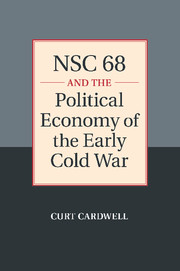Book contents
- Frontmatter
- Contents
- Acknowledgments
- Abbreviations
- Introduction
- 1 NSC 68 and the Problem of Origins
- 2 Multilateralism, the Soviet Threat, and the Origins of the Cold War
- 3 Multilateralism, the Dollar Gap, and the Origins of the Cold War
- 4 The Dollar Gap and Its Discontents
- 5 The British Sterling-Dollar Crisis of 1949–1950
- 6 The Origins and Development of NSC 68
- 7 The Political Economy of Rearmament
- Conclusion
- Select Bibliography
- Index
- References
2 - Multilateralism, the Soviet Threat, and the Origins of the Cold War
Published online by Cambridge University Press: 05 July 2011
- Frontmatter
- Contents
- Acknowledgments
- Abbreviations
- Introduction
- 1 NSC 68 and the Problem of Origins
- 2 Multilateralism, the Soviet Threat, and the Origins of the Cold War
- 3 Multilateralism, the Dollar Gap, and the Origins of the Cold War
- 4 The Dollar Gap and Its Discontents
- 5 The British Sterling-Dollar Crisis of 1949–1950
- 6 The Origins and Development of NSC 68
- 7 The Political Economy of Rearmament
- Conclusion
- Select Bibliography
- Index
- References
Summary
Even if there were no Russia, if there were no communism, we would still face very grave problems in trying to exist and strengthen those parts of the free world which have been so badly shaken by the war and its consequences, the two wars and the consequences of both of them.
Dean Acheson, January 1950The United States emerged from World War II as a global power of the first order. The depression of the 1930s, frightening in its scope and duration, and the war, traumatic and bewildering in the dimensions of its horror, lay in the past, although neither would be forgotten easily. Nonetheless, for the United States the future looked fairly bright. The war had been won, in no small part due to the United States' valiant effort; and the United Nations, which held out hope that future wars would be prevented through dialogue and collective security, had been created largely at its behest. In addition, the economy seemed to be rebounding from the long depression of the 1930s, although concern that the war's end would see depression conditions return created its share of anxiety. Perhaps more important in the immediate term, defeating fascism and Japanese militarism restored faith in the American way of life after years of collective self-doubt brought on by the depression. When in February 1941 Henry Luce, publisher of Time, Life, and Fortune magazines, announced the arrival of “the American century,” it is unlikely that many Americans shared Luce's optimism; there was still too much of which to be wary – an ongoing depression, war raging in Europe and Asia, and a sense that the United States itself may be threatened.
- Type
- Chapter
- Information
- NSC 68 and the Political Economy of the Early Cold War , pp. 28 - 57Publisher: Cambridge University PressPrint publication year: 2011



